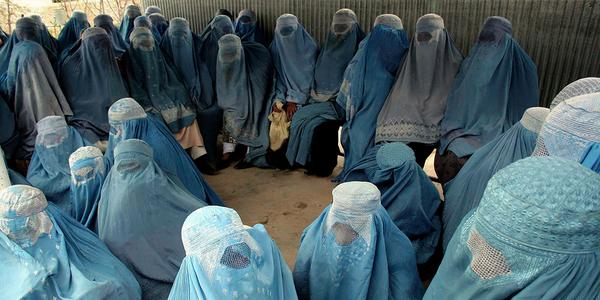The 29 prohibitions that the Taliban impose on women
The Taliban have once again risen to power in Afghanistan after its president, Ashraf Ghani, left the country last Sunday and the Islamist group took control of Kabul. Since then, thousands of citizens have fled desperately fearing that religious fundamentalists will once again impose their law, the 'Sharia', with the implications that this would have, especially for women and girls.
They are the most threatened by the new Taliban regime. The Islamist faction assures that with their laws they only aspire to "create safe environments, where the chastity and dignity of women are finally sacrosanct, as reflected in the Pashtun beliefs about life in 'purdah' (practice to hide life female in public). Before coming to power, the Revolutionary Association of the Women of Afghanistan (RAWA), has tried to systematize the main abuses to which they are subjected, many of which involve real violations of their human rights.
Related news
At least three killed in a protest against the Taliban in Jalalabad
Defense concludes the repatriation in Kabul of the first group of Spaniards and Afghans
Video | The moving message of a girl from Kabul: “We don't count. We will slowly die in history»
A life that is not life
That is what the Taliban have imposed on women and girls in Afghanistan from 1996 to 2001 and that is summarized in the following points, although as RAWA explains, the list is only a small sample of the female reality under the yoke of this insurgent group:

1. Female work is strictly prohibited outside the home. Only a few female doctors and nurses are allowed to work in certain hospitals in Kabul to treat women and girls.
2. Women are prohibited from leaving the house to carry out any activity as long as they are not accompanied by their 'mahram', a man of close kinship, such as father, brother or husband.
3. Women are also not allowed to close deals with male traders.
4. Medical care is also precarious for women, since they cannot be attended by male health workers. As there is such a small number of female doctors and nurses, there are many who cannot access adequate care, which leads to serious health problems and even death.
5. Education is forbidden to women. They cannot go to study at schools, universities or any other educational institution.
6. Women cannot show any part of their body in public, so they are forced to wear a long veil that even covers their face (burqa).
7. All those women who do not dress according to the rules established by the Taliban or who are not accompanied by their 'mahram' will be subjected to whipping, beatings and verbal abuse.
8. Women who show their ankles will be subjected to whipping in public.
9. Women accused of having sex outside of marriage will be stoned to death.
10. The use of cosmetic products is prohibited. In fact, during the Taliban 'reign of terror' between 1996 and 2001, there were reports of finger amputations in women arrested for having painted nails.
11. Women are prohibited from talking to or shaking hands with men other than their 'mahram'.
12. No stranger should hear a woman's voice, which is why women are forbidden to laugh in public.
13. It is also forbidden for women to wear high-heeled shoes, as they can produce noise when walking (a man cannot hear a woman's footsteps).
14. Women cannot get into a taxi without the company of their 'mahram'.
15. Women cannot have a presence on radio, television or in public meetings of any kind.
16. Sport is also banned for the female gender. They cannot practice it or access any sports center.
17. Women are prohibited from riding bicycles or motorcycles.
18. It is forbidden for females to wear brightly colored clothes, as the Taliban say they are "sexually attractive colors".
19. Women may not gather on the occasion of festivities for recreational purposes.
20. They cannot wash clothes in rivers or public squares.
21. In the Taliban regime, no street, square or avenue can have the word 'woman' in its name. Thus, during the Taliban regime in Afghanistan in the 1990s, the "Garden of Women" in Kabul was renamed the "Spring Garden".
22. Women are also not allowed to look out of the balconies or windows of their homes. They must not be seen.
23. To prevent any stranger from seeing a woman, it is mandatory that the windows are opaque.
24. Tailors cannot measure women or make women's clothing.
25. Women are prohibited from using public toilets.
26. There is segregation on buses. Thus, there are means of transport for men and others for women.
27. Women are prohibited from wearing flared pants, even when they are hidden under the burqa.
28. Nobody can photograph or film women.
29. In addition, it is totally prohibited to publish printed images of women in magazines and books. Nor can images of women be hung in houses and shops.
Very restrictive rules
Added to this regulation, which seems to have no end, are other prohibitions that affect both men and women and that restrict the basic rights and freedoms of the population. Thus, citizens under the Taliban regime are prohibited from listening to music, watching movies, television and, ultimately, any type of video. Also, it is mandatory for all people who have a non-Islamic name to change it.
On the other hand, youth are required to shave their hair and men must wear Islamic clothing and a cap. Men may not shave or trim their beards, which must grow to at least a fist below the chin.

